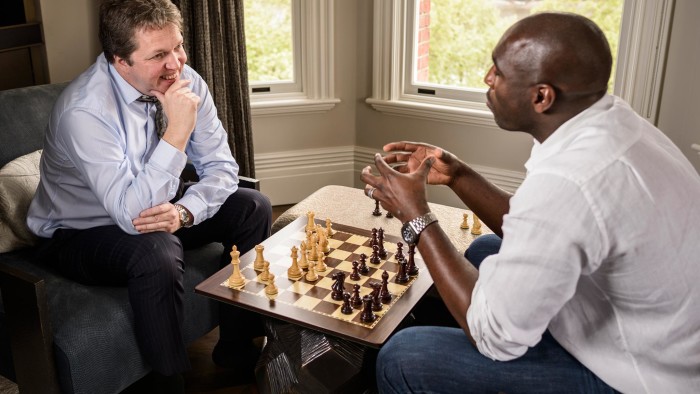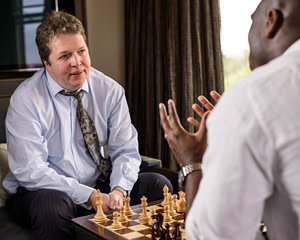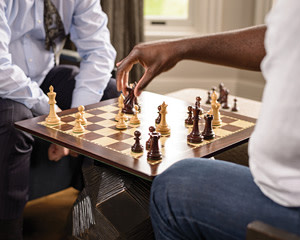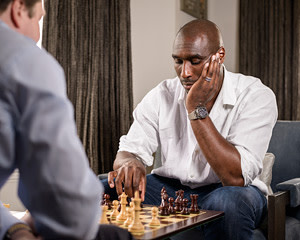Chess grandmaster class: Nigel Short v Sol Campbell

Simply sign up to the Life & Arts myFT Digest -- delivered directly to your inbox.
It was with no small measure of trepidation that I ventured down to Chelsea one morning with an assignment to play Sol Campbell at my métier – chess. The former England footballer had mentioned during a radio interview that he enjoys the game and that it helps him to think strategically. My brief was to challenge Campbell to a friendly match, from which he would derive some improvement to his chess. In turn, I would learn more about this man who was once the defensive backbone of – successively and controversially – deadly rivals Tottenham and Arsenal.
When Campbell greeted me at the door, I sensed, as many others had done before, that dodging past this imposing figure would be a well-nigh impossible task. Of course, the big man warmly invited me into his spacious flat, where he lives with Fiona, his interior-designer wife of four years, and their two children. As we waited in the kitchen for the coffee to brew, I confessed the root cause of my anxiety: I am not, in fact, a journalist, and I had never actually interviewed anyone before. Furthermore, a life-long career as a professional chess player, undertaken in near-Trappist silence, has ill equipped me with the arts of conversation.
It soon became clear that I was not the only one with apprehensions. Happening to mention, en passant, that I had challenged Garry Kasparov for the World Chess Championship in 1993, a sudden realisation darted across Sol’s face that he had let himself in for a little more than just a game of gentle wood-pushing. Glancing at my portly middle-aged frame, he accurately surmised the situation. “So, this is going to be like you playing me at football?”
“Er … yes.”
My physical capabilities were soon tested to the limit when I was asked to assist in moving the chairs and table so that our battle could commence. The furniture was extraordinarily heavy. I feared a repetition of a spinal disc hernia I had suffered a few years previously but stayed mute. After a few heaves and grunts, the moment of danger passed.
I drew the white pieces and began with my customary opening move, 1.e4. Sol, in reply, hesitantly pushed his a-pawn, on the wing, two squares forward. I inwardly winced. This advance has, on exceedingly rare occasions, been used by moderately strong players to show utter contempt for their opponents. It was once even played by the legendary Danish grandmaster, Bent Larsen, but only when terminally ill and his judgment was shot to pieces. But more often than not, it is seen only from beginners. I thought I had better offer a few tips …

“OK,” I said, “you will tell me whether it is the same in football. In chess one of the key principles is control of the centre.”
“The centre, yes.”
“So your second move was absolutely fine, and these moves were OK, but this one is … ”
“Not necessary.”
Encouraged by the speed with which he was picking it up, I sought further parallels between these two disparate sports. In his recently published authorised biography, Sol talks of his ability to anticipate situations, so I ask him to explain.
“I was able to see and move from 60, 70 yards away,” said Sol. “I could pinpoint a couple of areas where I knew the ball was going to roughly land through certain movements in certain positions of players.”
“But isn’t it more a percentage thing?” I asked. “You don’t know exactly because the guy can turn the other way and the ball can go the other way.”
“It’s probability but … also it’s guessing who is strong. It’s guessing the position of certain players. It’s guessing the other team feels they’ve seen a gap and they’re going to go for it,” said Sol.
“That kind of thing, where you see them setting up to go down a certain way. Or maybe we’ve got a left side, it’s a little bit weak, or a young player who has not really played many games, and so they want to attack the weakest point. Yes, they will go both sides but, if they know one side is slightly weaker, then they are always going to attack [it]. Try to, anyway.”

This was something I could relate to. I explained that to prepare for an opponent, I use a chess database of almost six million tournament games, which I trawl for patterns in his style. The more skilled one becomes in using the data, the greater the accuracy of predicting what will happen. In one of Sol’s early international appearances, the Chilean striker Marcelo Salas ran rings round him. Sol was determined not to let this happen again and soon became far more proficient at containing maverick goalscorers. These days, serious teams analyse using a lot of video footage but, as Sol pointed out, there is no substitute for on-field experience.
…
Our game progressed. Sol was doing his best to mitigate the effects of his inauspicious start. Deftly avoiding getting his bishop trapped, he then castled queenside into relative safety when the heat increased around his king.
I mentioned that I sometimes give simultaneous exhibitions, playing up to 30 players at a time. Sol was fascinated by this – perhaps because there is nothing remotely comparable in football.

“How long does that take though – 10 hours?”
“No, not that long,” I said. “My longest ‘simul’ was about six and a half hours.”
“Did you win all your games?”
I told him that I do these things quite often and typically I would score about 90 per cent.
“Ninety per cent wins. Wow … simultaneous – that’s like me playing about five games. That’s incredible. But you don’t do that all the time?”
Not at all, I explained: I do them all over the world – New Zealand, Brunei, Malawi, Argentina.
Sol was equally amazed when I mentioned that, at 49, I was the oldest player in the top 100 and decades past my peak. “Really?” he said. Indeed, I confirmed: it’s a young man’s game. Magnus Carlsen, the world champion, is 23.
“What, you mean, like, you finish at 40?” he exclaimed. “That’s professional footballers!”

Well, not precisely, I explained, because mental decline tends to be less precipitous than physical deterioration but not very far off either. “I thought forties was the new thirties,” said Sol. “There’s no hope for me, is there?”
Sol was noted for his great assiduousness in training. I put to him the theory of Dr John Nunn, my fellow chess grandmaster, that motivation – basically, enthusiasm for hard work – wanes after several years in the job. Interestingly, Sol didn’t disagree but, of course, when you’re paid by your club, you have to do it anyway. In individual sports, with no one watching you, skiving is a strong temptation but it is absolutely fatal.
In a move highly reminiscent of the “Poisoned Pawn” variation of the Sicilian Defence, Sol ate my b-pawn with his queen. This morsel was far more toxic than usual because his king lay directly behind the newly opened line and he would soon be subjected to a vicious attack. Unfortunately, he didn’t really have a choice …
Now Campbell has retired – he quit playing in 2012 – I wondered what would come next? He could probably afford to sit on his posterior and drink gin and tonics for the rest of his life but it would be a melancholy, mentally atrophying living death. He is not even 40 and is obviously way too young – and nor does he have the temperament for a life of indolence and dissipation.

Sol talked about various plans with Fiona for the design and furniture business. He even floated the idea of a career in television. But when I pushed him, he readily acknowledged: “Ideally, I’d love to become a manager; it would be great to win all the things I’ve never won in my career.” Sol is partway through getting his coaching credits with the Welsh Football Association. How about the prospect, some time in the future, of becoming the manager of England? “Oh yes, I would relish the chance of that if it came up. Definitely. I think that is one of the ultimate things you could do.”
For Sol, nothing could provide the same exhilaration as playing but guiding a team towards success would be very satisfying nonetheless. I knew what he meant: as a former coach of the chess team of the Islamic Republic of Iran, I had experienced such highs as my team winning the bronze medal (behind India and China) in the 2006 Asian Games, in Doha. Wonderful as the reflected glory of this achievement was, it could not be compared to the almost sexual joy of competing, and triumphing, yourself.
By now my rooks and queen were lining up in anticipation of a devastating breakthrough. I asked Sol how he thought he might best attempt to thwart the impending calamity. I was certain that, as a fine defensive footballer, he would want to rush over his pieces to the threatened area as fast as possible. Instead he preferred to evacuate his king – the equivalent of moving the goalposts – an option not normally available in the Premier League. In principle it wasn’t such a bad idea but the king is a rather slow-moving piece and the game is often decided before his majesty reaches safety.
Sol’s diplomatic skills were in evidence when I asked about his shocking treatment at the hands of disgruntled “fans” after his famous switch from Tottenham to Arsenal in 2001. Given the crude, tribal nature of football loyalty, it was probably inevitable that he would cop a bit of stick for switching from one north London rival to another. What could not have been anticipated was that the abuse would continue for several years and would include constant racist chants, insulting him, his family and questioning his sexuality in crudely offensive ways (Sol is not gay; nor is he homophobic). “It was making my life a kind of hell, it was taking so much of my energy to get through a game.” The abuse continued when he went to Portsmouth. Eventually he involved the police, who prosecuted some of the perpetrators, before the problem finally ceased. “That shouldn’t be down to me. [The FA] stuck their heads in the sand … It should have been stamped on straightaway.”

It seems obvious that racism was the main factor in this obsessive persecution. Sol was not the first footballer to change clubs but the extent of the torment he had to endure was extreme. His supposed crime of “treachery” unleashed the expression of vile sentiments. While not ignoring the racist aspect of his vilification, Sol, in a statesmanlike manner, downplayed the issue when we talked about it. I wondered if the furore concerning the most extravagant claim in his biography – that he might have been England captain for 10 years had he not been black – influenced this circumspection?
Sol was quick to point out that he hadn’t written the book (although, he added, it was “fantastic”) and that “Simon [the author] put his own spin on it”.
“Who the hell is captain for 10 years, these days?” I asked.
“Not many people but I should have captained the side more than three times.”
True, I agreed, but that’s a totally different proposition to being captain for a decade.
“Now I have corrected it. My career was going upwards … and I was captain of other clubs. I did all the right things, I was winning things, I was becoming the best. At one stage I was the best defender. And it [the captaincy] was getting passed around me. It was bizarre.”

I suggested that the shoulder injury he had sustained in September 2000 shortly after standing in as England captain had been the decisive factor. When Campbell recovered and returned to the England squad, he had been replaced by David Beckham, who could not be expected to suddenly make way for his predecessor. Sol didn’t dispute that but shot back: “Then [why] not vice-captain?”
Indeed. He was clearly unhappy that players such as Michael Owen, for whom he has the greatest respect as a player but who perhaps lacked the leadership skills, edged ahead of him.
…
We talked about England’s chances in the then imminent World Cup, about which Sol, in the event, was little optimistic.
“Are we going to get past our group?” I inquired.
“Yes – I think England and Italy will get through,” he predicted. “But thank God we are playing Italy in the first game. If we had to play them in the last game, that could have been a bit tricky. Even if you lose the other game, you’d be able to beat the other two easy.”
“Well, not so easily … ”
“Not easy but we’ll get through.”

I found his confidence touching but recalled that throughout my entire life I have heard high hopes for English football, which have rarely, if ever, been met. And, at Brazil 2014, it happened yet again. Sol was alert to the long-term problem of the Premiership having too many foreign players: they raise standards but can also crowd out local talent. The balance has probably tipped too far.
Sol’s king had not escaped very far. My strikers were all over the penalty box and in chess there is no such thing as offside. About three hours after our game began, it concluded in checkmate. Sol, not for the first time, spoke positively about the benefits of chess and how it put him in a different mental zone. One phase of his footballing career may be firmly over but I am sure we have not heard the last from this thoughtful man.
——————————————-
Twitter: @nigelshortchess; ‘Sol Campbell, The Authorised Biography’, by Simon Astaire, is published by spellbindingmedia.co.uk. This is the first of an occasional series
Photographs: Richard Nicholson
Comments